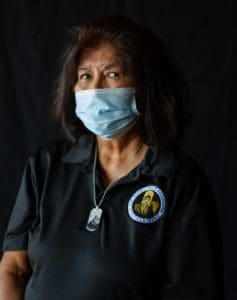What Do I Need to Know About the COVID-19 Vaccine?
To protect our elders and the greater community, we need to use all of our prevention tools. Vaccines are one of the most effective tools to protect our health. Vaccines work with your body’s natural defenses so you can fight COVID-19. Other protective tools are to wash your hands frequently; wear a mask indoors and in public; and wear a mask indoors when around people outside your circle of trusted friends, family, and coworkers.
The COVID-19 vaccine helps to keep you from getting sick.
COVID-19 can cause serious illness or death. All COVID-19 vaccines available in the United States are effective at helping prevent COVID-19. Even if you become sick after you are vaccinated, you should be protected from more serious illness.
 Free COVID-19 vaccine and booster shots
Free COVID-19 vaccine and booster shots
The United States government is providing the vaccine and booster shots free of charge to all people in the U.S.
The COVID-19 vaccine will NOT give you COVID-19.
COVID-19 vaccines cannot make you sick with COVID-19. They do NOT contain the virus that causes COVID-19. Vaccinations protect you and those around you from becoming infected with the coronavirus.
Get vaccinated even if you have already had COVID-19.
Even if you have already had COVID-19, it is possible to get COVID-19 again. Experts do not yet know how long you are protected from getting sick again after having had COVID-19. Vaccination is the best protection from re-infection and serious illness.
COVID-19 vaccination side effects
After receiving the COVID-19 vaccination, you will be asked to wait for 15 minutes to make sure you don’t have any reactions. Afterward, you may have redness, pain, and swelling at the injection site. You may also experience tiredness, headaches, muscle pain, chills, and fever for a few days. These are normal signs that your body is building protection against COVID-19.
If you are or want to become pregnant, COVID-19 vaccination is recommended.
COVID-19 vaccination is recommended for all people six months and older, including people who are pregnant, breastfeeding, currently trying to get pregnant, or might become pregnant in the future. Pregnant and recently pregnant people are at an increased risk for severe illness from COVID-19 when compared with non-pregnant people. There is no evidence that any vaccines, including COVID-19 vaccines, cause fertility problems in women or men.
COVID-19 vaccines do NOT change DNA.
Different types of vaccines work in different ways to offer protection, but COVID-19 vaccines — like any other vaccine — cannot affect your DNA in any way.
COVID-19 vaccines are safe, even for people with underlying medical conditions.
People with medical conditions like heart disease, lung disease, diabetes, and obesity are more likely to get very sick from COVID-19. Vaccination is especially important for people with these conditions.
People with weakened immune systems may not get as much protection from COVID-19 vaccination as those with a functioning immune system. That is why the CDC recommends people with moderately to severely compromised immune systems receive an additional dose of a COVID-19 vaccine at least 28 days after receiving the second dose of the Pfizer or Moderna vaccine.
The U.S. monitors the safety of all vaccines.
All COVID-19 vaccines used in the U.S. were tested in clinical studies involving thousands of people, including American Indians and Alaska Natives.
All authorized COVID-19 vaccines meet the Food and Drug Administration’s (FDA) rigorous scientific standards for safety, effectiveness, and manufacturing quality. The FDA found there were no serious adverse medical events related to the Pfizer-BioNTech Covid-19 vaccine. The FDA reported in August 2021 that there isn’t insufficient information to determine a causal relationship between adverse medical events and the Moderna vaccine.
Prevention Guidelines
- Stay up-to-date with your vaccinations.
- You may not need to wear masks outdoors.
- Wear a mask if you are sick and need to be around others or are caring for someone with COVID-19.
- If you are at risk for severe illness, wear a mask indoors when you are in public.
- Stay home if you are experiencing symptoms of COVID-19.
- Communicate about prevention strategies with the people you meet in person.
Elders are the foundation of our communities, the living legacies of traditions, and they must be kept safe. Now more than ever is the time to seek out their wisdom on how we can adapt our ceremonies and practices at home. We must protect the ones we love. Join us in the fight to keeping our elders safe.
Resources
The coronavirus (COVID-19) has resulted in an unprecedented crisis that affects our daily lives as well as our physical, mental and even financial health. To address these needs, the National Indian Council on Aging is committed to providing credible information and resources to help people navigate through this crisis.
In this list you will find information on financial assistance for tribes, prevention steps for caregivers and nursing homes, eldercare resources, and more.